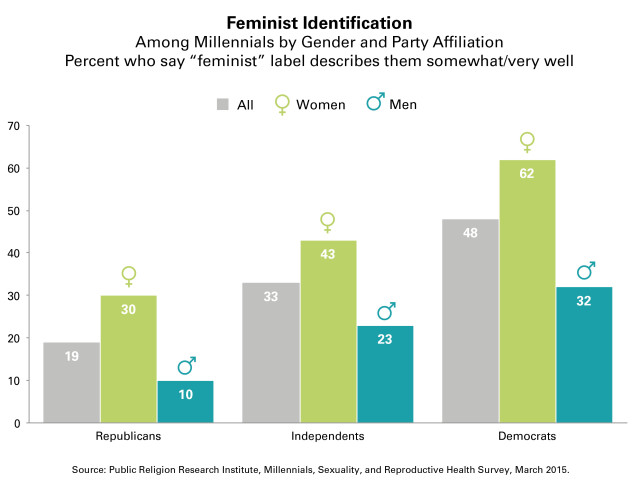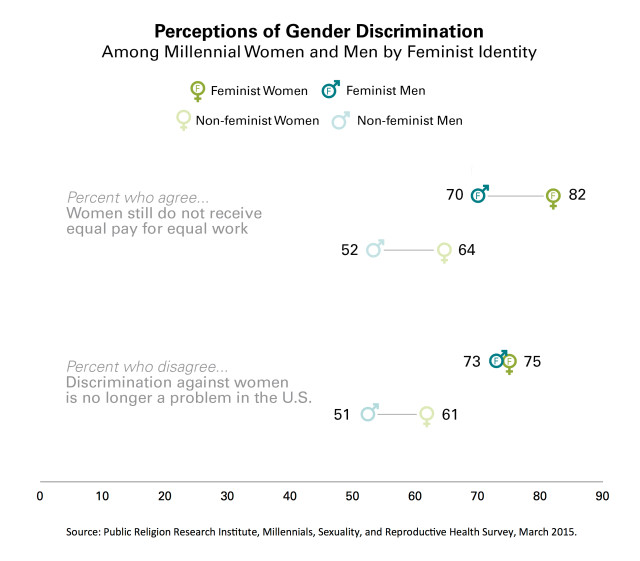Despite its straightforward definition of someone who advocates for equal social, political, legal, and economic rights for both genders, the term “feminist” has become politically charged and wrought with stigma, leading many to feel uncomfortable associating with the label. PRRI’s recent survey on millennials, sexuality, and reproductive health provides some insights into American feminists, age 18-35—who they are, who they’re not, and what they believe.
1. Less than half of millennial women identify as “feminist.” Among millennials, just 47 percent of women identify as a feminist, and less than one-quarter (22 percent) of men associate themselves with the label. Overall, 35 percent of millennials identify as feminists, while 65 percent do not.
2. Democratic millennial women are twice as likely as Republican millennial women to identify as feminists.
Political affiliation makes a notable difference in just how many men and women identify with the label: Democratic women are twice as likely to call themselves feminists (62 percent) as Republican women (30 percent), while Democratic men are three times more likely (32 percent) than Republican men (10 percent). Independents lie somewhere in the middle, with 43 percent of independent women and 23 percent of independent men identifying as feminists.
3. Race makes no difference on millennial feminist identification. White (32 percent), black (36 percent), Hispanic (37 percent), and Asian-Pacific Islander (API) millennials (37 percent) are all just as (un)likely to identify with the term. Hispanic (50 percent) and API millennial women (53 percent) are the most likely to call themselves feminists, compared to 43 percent of white and 47 percent of black millennial women.
4. Millennial feminists are more in favor than non-feminists of expanded access to contraception and abortion services, including: expanding access to birth control for women who can’t afford it (91 percent vs. 76 percent); saying that contraception is critical to the financial security of women (73 percent vs. 52 percent); and thinking privately owned corporations should be required to provide their employees with health care plans that cover contraception at no cost (72 percent vs. 50 percent).
Millennial feminists also support easier access to abortion than non-feminists—majorities support abortion’s legality in all or most cases (66 percent vs. 49 percent) and oppose making it more difficult for a woman to get an abortion (68 percent vs. 50 percent).
When it comes to “pro-choice” and “pro-life” labels, millennial feminists are much more likely than non-feminists to identify with one or both labels. More than nine in ten (93 percent) millennial feminists identify as “pro-choice” (38 percent), “pro-life” (18 percent), or both (37 percent), compared to 70 percent of non-feminists who identify as “pro-choice” (21 percent), “pro-life” (28 percent), or “both” (21 percent). Only seven percent of millennial feminists say they identify with neither, compared to 29 percent of non-feminists.
5. A gender gap exists between millennials on the issue of equal work for equal pay—but disappears when asked about gender discrimination in the United States.
Majorities of both female (82 percent) and male (70 percent) millennial feminists agree that women don’t receive equal pay for equal work—but a 12 percentage point gap still exists between the genders. That gap disappears when asked if gender discrimination is still an issue: 75 percent of female and 73 percent of male millennial feminists disagree that discrimination against women is no longer a problem in the U.S. today—which means that 24 percent of female millennial feminists agree that gender discrimination is no longer a problem.
For more findings, read “How Race and Religion Shape Millennial Attitudes on Sexuality and Reproductive Health.”



